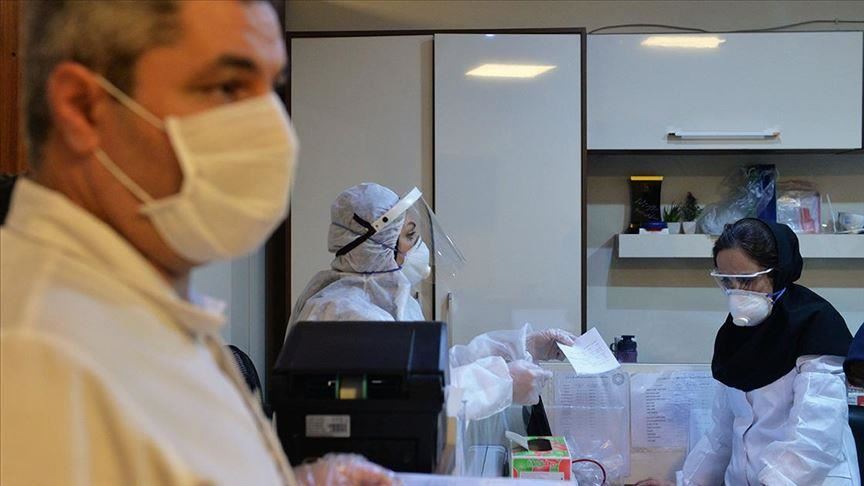Iranians on life under coronavirus self-isolation
On Thursday, Iranian authorities say death toll from coronavirus outbreak rose to 429

TEHRAN
While coronavirus cases continue to pile up and fatalities show an alarming surge, people in Iran are getting accustomed to a new life in self-isolation.
According to Iran’s Health Ministry, 75 deaths have been reported over the past 24 hours – the highest single-day death toll since the outbreak of virus three weeks ago.
The uncertain situation has prompted people to stay home most of the time – with some skipping their work, and others canceling their meetings and changing their travel itineraries.
“Your safety and well-being should always come first,” said Ali Nasri, a 36-year-old software engineer from Tehran, who works from home these days.
“I feel we somehow underestimated its impact until it spread and the cases multiplied across the country, now we are literally under house arrest.”
Earlier this week, Iran’s Telecom Ministry announced 100 GB free Internet in a bid to encourage people to stay home.
Nasri is thankful for the government’s initiative but thinks the speed of the Internet is “too slow.”
“It is good for me since I am working from home these days, but the speed could be a little better,” he told Anadolu Agency, adding that he is “still thankful”.
Events cancelled
The outbreak of the contagious disease, which has already affected 10,075 people in Iran, has forced authorities to cancel all important public events, sports events, congregational Friday prayers and the upcoming film festival in Tehran.
Milad Mohammadi, a 19-year-old football enthusiast from Tehran, said it is “frustrating” to stay home, as he cannot go to a local indoor football facility to play with his friends.
Worse still, he cannot watch his favorite soccer teams Persepolis and Esteghlal play, as the football league has been called off.
“It is a frustrating situation, to not be able to play, to not be able to watch matches on TV, to not be able to hang out with friends,” Mohammadi told Anadolu Agency.
“At the same time, it is sad to see people dying. We hope and pray this misery ends soon,” he added.
For Shair Abbas, a university student and researcher, it is a different and equally exasperating trial, since universities have been temporarily shut and classes have moved to the online sphere.
“I am writing my Master’s thesis these days and I need to consult my supervisors regularly,” he told Anadolu Agency.
“It’s been three weeks that universities are closed and I have lost momentum,” he added.
‘Novel experience’
Although classes have moved online, students are not accustomed to the new medium.
For Ameer Abdollahi and his friends at Tehran University, it is completely a “novel experience.”
“The conventional type of teaching works for most of us, and it is sad that we have been bereft of that due to this health scare,” they told Anadolu Agency.
“We expect some good news by the New Year,” they said, referring to Nevruz – the Iranian New Year – which begins on March 21.
The New Year celebrations are full of fanfare and revelry – warm and cozy family gatherings, outstation trips, shopping sprees and dine outs. This year, however, New Year doesn’t seem to be a happy one.
“For Iranians, Nevruz is the most important and joyous occasion, time to forget all problems and celebrate,” said Sara Hassani, a Tehran-based theater artist.
“But this year we have to cancel all our plans due to the grim situation we are in,” she said.
Hassani and her family had plans to travel to the northern province of Gilan, a prime tourist attraction situated along the Caspian Sea, where they had already booked hotel rooms for a few days.
“Right now the priority is our health and well-being,” she told Anadolu Agency. “New Year will come again and we will have more opportunities to travel and have fun.”
Shortage of masks, latex gloves
In the wake of the coronavirus outbreak, inter-city transportation has been restricted, especially to cities worst hit by the virus, like northern provinces of Mazandaran and Gilan.
People have been advised not to travel to other cities and stay home.
While staying home can be frustrating for some, for 45-year-old Marzieh Khanom, who hails from the southern city of Shiraz, it is a blessing in disguise, since her two children are home these days.
“My two children study in Tehran, which is probably the worst hit city in Iran, and I made sure they leave the city and come home,” she told Anadolu Agency over phone.
“It is good to have them with me and at home until the situation gets better.”
Meanwhile, in Tehran and other major cities, the shortage of face masks and latex gloves has also forced people to not wander around.
“These masks work for a day or two, and I finished the stock I had,” Haider, a property dealer, said.
“I have been looking to buy new masks but all medical stores are running short of it.”
He spends most of the time these days watching his favorite shows on television.
“It is good to catch up on all that I had missed and it is also good to spend some quality time with my children,” he told Anadolu Agency.
“But I want this phase to be over soon. It is a dark phase.”
This week, the new cases of coronavirus in Iran have almost doubled and deaths reported from the virus have also doubled, making the job of health authorities even difficult.
“It is peaking right now, as the latest figures would suggest,” said an official from the Health Ministry. “The rise in fatalities is indeed shocking, and we hope it can be contained.”
Anadolu Agency website contains only a portion of the news stories offered to subscribers in the AA News Broadcasting System (HAS), and in summarized form. Please contact us for subscription options.







